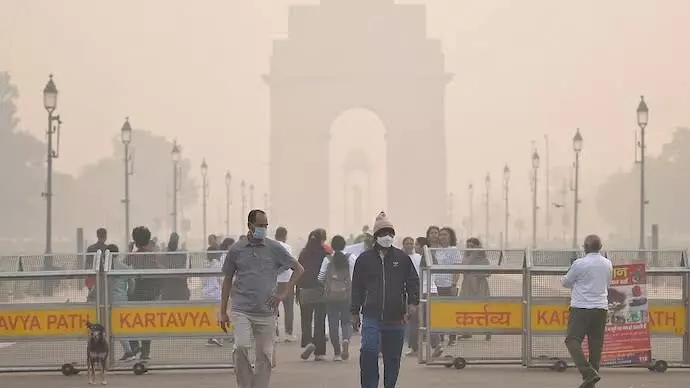Air Pollution Explained: How poor air quality impacts lungs, heart and mind
Air pollution can trigger allergies, skin problems and eye irritation
By Neelambaran A
Air Pollution Explained: How poor air quality impacts lungs, heart and mind
Hyderabad: Poor air quality poses significant risks to human health. It adversely affects multiple organ systems – the respiratory system primarily, the cardiovascular health and mental health face a secondary impact.
What are the short-term and long-term effects of air pollution?
Exposure to poor air quality can lead to immediate and long-term respiratory problems, while short-term effects include coughing, wheezing and throat irritation. Prolonged exposure can be dangerous leading to asthma, bronchitis and lung cancer.
Cardiovascular health is also severely affected, as fine particles enter the bloodstream through the lungs, causing inflammation and potentially leading to myocardial infarctions (MI) and strokes. The brain too gets affected, with studies relating air pollution to cognitive decline and increased risk of neurological disorders.
Air pollution can trigger allergies, skin problems and eye irritation.
Mental health can also suffer, especially when poor air quality limits regular outdoor activities and normal life patterns which can lead to anxiety, depression and a reduced quality of life. Children and the elderly, besides people with lung-related issues, are the most affected.
How does air pollution impact lung health?
Air quality in metropolitan cities is witnessing a continuous downfall due to factors including vehicular emissions, industrial pollution, construction dust and burning biomass. The declining air quality first affects the respiratory system, particularly the throat and lungs, while also hurting exposed areas like the eyes, nose and skin.
Dr V Harish Kumar, a pulmonologist at Amor Hospitals, Kukatpally, Hyderabad said, “Exposure to poor air quality can cause immediate symptoms like running nose, nasal irritation and congestion. Long-term exposure poses more serious risks, potentially leading to chronic conditions including bronchitis, asthma, allergic rhinitis and allergic bronchitis.”
People with pre-existing conditions such as COPD (Chronic obstructive pulmonary disease) or bronchial asthma often experience more frequent and severe symptoms and may even develop pneumonia.
The impact can be severe during winter months when humidity traps more dust particles in the air. Hence, extra caution is advised. Common symptoms can also include eye irritation, allergic conjunctivitis, skin problems and chronic cough due to carbon particle exposure.
“Preventive measures are essential, particularly for those with sensitivities to dust and/or smoke. These include wearing masks when outdoors and using air purifiers and filters indoors,” Dr Harish Kumar suggested.
Increased risk of heart attacks and strokes
Air pollution severely affects cardiovascular health, as carbon particles accumulate in blood vessels, increasing the risk of heart disease. Poor air quality can significantly impact heart health through various mechanisms.
Dr Naveen Kumar Cheruku, senior interventional cardiologist at Gencare Poulomi Hospitals, Hyderabad, said, “When we breathe polluted air, fine particles (PM2.5) can enter our bloodstream through the lungs, causing inflammation in blood vessels and leading to increased blood pressure. This could lead to heart attack, and we are witnessing an increase in strokes due to this.”
Other important effects include hardening of arteries, irregular heart rhythms and blood clots, increasing the risk of heart attacks and strokes. People with morbidities including heart conditions, complications from old age and hypertension are particularly vulnerable.
Common symptoms include chest pain, shortness of breath and irregular heartbeat. Regular monitoring of air quality and taking preventive measures is crucial.
How does air pollution affect mental health?
The toll on mental health due to air pollution is significant.
Given the lack of awareness and stigma around mental health, people often overlook the mental health issues that crop up when people have to limit themselves indoors to avoid developing chronic respiratory conditions from going outdoors.
Dr Anitha Rayirala, consultant psychiatrist at Amor Hospitals, listed the common mental health challenges due to air pollution:
- Depression and anxiety
- Social isolation
- Reduced quality of life
- Panic attacks, especially when experiencing breathing difficulties
- Stress from lifestyle restrictions
- Feelings of worthlessness
“In severely polluted cities like Delhi, children are often confined indoors, unable to attend school or play outside. These restrictions can significantly impact their mental well-being and development,” Dr Anitha said.
How to cope with the problem of air pollution?
The double challenge of air pollution and mental health issues has varied effects on socioeconomic groups. While higher-income individuals have the capacity to afford medical treatment for physical conditions, they cannot escape pollution exposure. Lower-income groups struggle to access any form of treatment, magnifying their stress and health issues.
“While physical health often takes precedence, mental health support is equally crucial. People should develop skills in managing indoor confinement, dealing with lifestyle modifications, handling anxiety about pollution exposure and maintaining mental well-being despite restrictions,” Dr Anitha added.
Though several people do not prioritise mental health problems, experts suggest seeking professional psychological support for moderate to severe depression. Developing proper coping skills is essential for managing both the physical and mental health challenges posed by air pollution.